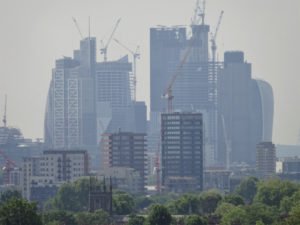As Clean Air Day (21 June) approaches, academics have urged more people to work from home in a bid to improve air quality, which they claim is costing the NHS and society more than £6 billion a year.
A study, published by Oxford and Bath universities and commissioned by sustainable behaviour change NGO Global Action Plan, warns air pollution is the largest environmental cause of death in the world today and diesel cars have a significantly higher impact then petrol, electric and hybrid vehicles.

Photo: Flickr / David Holt
The study claims the “perhaps inconvenient truth” is that everyone has a role to play in “accelerating action” on air pollution and recommends more people work from home, car-pool or use teleconferencing to reduce pollution.
“The more we can do any of these actions, the cleaner our air will become,” the report states.
Dr Christian Brand from the University of Oxford’s School of Geography and Environment, and Co-Director of the UK Energy Research Centre, said: “Cars and vans are responsible for 10,000 early deaths each year, and diesel vehicles are the main problem unfortunately.
“The valuation of health effects associated with diesel vehicles are at least five times greater than those associated with petrol vehicles, and around 20 times greater than battery electric vehicles. These results raise important questions as to how best to develop effective and fair air quality and transport strategies in urban areas.”
Up to 40,000 deaths in the UK are associated with toxic air each year. According to the European Commission, 16 zones in the UK, including London, Birmingham, Leeds and Glasgow, are exceeding nitrogen dioxide limits, often due to road traffic.
Chris Large, Senior Partner at Global Action Plan added: “This report clearly illustrates the true cost of air pollution from each petrol and diesel car and van, particularly in inner cities.
“Swapping one in four car journeys in urban areas for walking or cycling could save over £1.1 billion in health damage costs per year. Switching 1 million cars from diesel to electric would save more than £360 million per year in health costs from local air pollution.”
Clean Air Day, which has been organised by Global Action Plan, is hoping to spread the word about air pollution and get people sharing information about how everyone can help to make the air we breathe safer and cleaner.
“This demonstrates the impact that people’s individual choices can have, so we would look to the government to use Clean Air Day as a springboard for year round public engagement through its new clean air strategy,” added Mr Large.
The full report can be read on the Clean Air Day website.
[interaction id=”5b06ab045c924cd114007054″]
What makes us susceptible to burnout?
In this episode of the Safety & Health Podcast, ‘Burnout, stress and being human’, Heather Beach is joined by Stacy Thomson to discuss burnout, perfectionism and how to deal with burnout as an individual, as management and as an organisation.
We provide an insight on how to tackle burnout and why mental health is such a taboo subject, particularly in the workplace.


